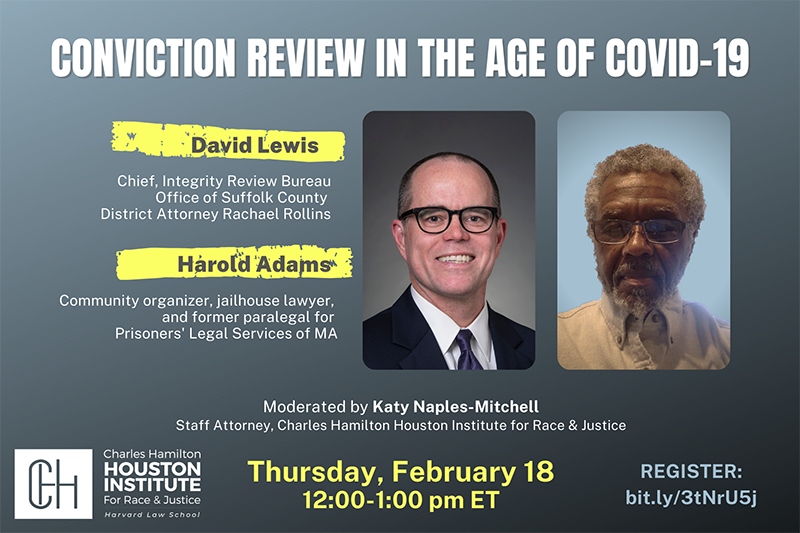
According to data compiled by The Sentencing Project, there are roughly as many people serving life sentences today in Massachusetts as there were sentenced people in the Commonwealth’s state prisons in total in 1970. What is required to undo decades of public policy based on racism and fear, and to instill practices and policies of mercy and healing? How should stakeholders account for the dozens of wrongful convictions in Boston, nearly all Black and brown men, and the systemic forces behind the policing and prosecution that rendered those convictions in the first place?
This panel—featuring David Lewis, Chief of the Integrity Review Bureau at the Suffolk County District Attorney’s Office (SCDAO) in conversation with Harold Adams, a longtime jailhouse lawyer, community organizer, and former paralegal for Prisoners’ Legal Services of Massachusetts—will explore the strengths and weaknesses, possibilities and limitations, of conviction integrity processes.
These questions have taken on even greater urgency as COVID-19 has decimated Massachusetts prisons. Thousands of people have gotten sick, and at least 21 incarcerated people have died from cases of COVID-19 contracted in Massachusetts prisons. Especially during the pandemic, how has the SCDAO Integrity Review Bureau helped secure releases of vulnerable elders from long prison sentences? What are the constraints? And what do communities most impacted by policing, prosecution, and incarceration demand in terms of reviewing cases, revising long sentences, and rectifying systemic injustices? Join the Charles Hamilton Houston Institute to engage these questions and more. The panel will be moderated by Houston Institute staff attorney Katy Naples-Mitchell.
Panelist bios:
DAVID A.F. LEWIS is an Assistant District Attorney and Chief of the Integrity Review Bureau at the Suffolk County District Attorney’s Office. Prior to becoming a prosecutor, Mr. Lewis was in private practice for over 23 years where his practice specialized in civil and criminal appeals in state and federal court. He has chaired, co-chaired, and presented at numerous appellate CLE seminars, and he is the author of many articles on appellate advocacy. Mr. Lewis is a graduate of Hamilton College and the University of Denver College of Law.
HAROLD L. ADAMS: “1947, Harlem New York City (NYC), I was born into a fractured childhood, as a family member of 3rd generation ex-slaves. At age 24 I was sentenced to life in prison. In prison I graduated from Boston University, summa cum laude (top honors). I morphed into a self taught legal scholar, published writer band organizer. I wrote briefs and memoranda resulting in the release of seven people from prison. In 1987, when I was in NYC’s infamous Rikers Island jail, I helped win compassionate release for one prisoner, a precedent which win the release of 53 prisoners who were dying from AIDS. My fellow Rikers prisoners called me “Ironsides,” because police brutality I put me in wheelchair (but I won a $10,000 settlement in prison) settlement. My later legal work set precedents before the Massachusetts Appeals Court, U.S. District Court, and the Board of Immigration Appeals. I did this while serving 31 years of a life-sentence, then 20 years to date on life-time parole, including working over 15 years as a paralegal, 11 years for a down-town law firm, then four years at Prisoners’ Legal Services. I helped organize migrant and seasonal farm workers in New York on Eastern Long Island’s infamous potato graders. I founded the Boston Committee of Friends and Relatives of Prisoners (CFROP). Under CFROP other volunteers and I organized free prison-visit transportation for families to every prison in Massachusetts, as well as prisons in Rhode Island and Pennsylvania. We stopped evictions, home foreclosures, and utility shut-offs. I believe I’m the only parolee ever, in Massachusetts, given permission, (based on academic achievement), to travel to a conference in Italy as an (self-taught in prison) apprentice mathematician with NATO’s Advanced Studies Institute (ASI). Another first: a Clerk Magistrate in Quincy District Criminal Court permitted me (while on parole) to successfully argue on behalf of a law firm client, resulting in non-issuance of a criminal complaint. My writings have been published in: The South African Beacon; Mandate (Pamphlet Series); Trotter Review; and Verdict Magazine; with ongoing columns: “Captive Audience” in The Commemorator (Black Panther Party); and many editorials in CFROP’s publication Inside/Outside. I have been keynote speaker at 25-plus schools, colleges, universities, organizations, and places of worship, an expert panelist many times, and the subject of media interviews, news articles and a chapter in a book, Forget Them Not. I’m blessed with 4 children, 8 grandchildren and 5 great grandchildren. I am a survivor, one year before I began serving 31 years in prison, I was shot in the head and blinded in one eye (Halloween night, 1970), I’ve survived multiple cancer-related surgeries, radiation, chemotherapy, hepatitis c, and brain injury due to a major car accident totaling my vehicle and hospitalizing me. I guess I’m here to stay because my heart and spirit are with the evolutionary struggle for a more JUST and Loving world for ALL people.”
Legislation referenced:
CEPS Parole bill: “An Act to Promote Equitable Access to Parole”
Senate: https://malegislature.gov/Bills/192/SD1065 | House: https://malegislature.gov/Bills/192/HD2124
Technical revocations parole bill drafted by CHHIRJ & ACLUM:
“An Act to Reform Parole Supervision in the Interest of Justice”
Senate: https://malegislature.gov/Bills/192/SD2212 | House: https://malegislature.gov/Bills/192/HD3620
Ending life without parole: “An Act to Reduce Mass Incarceration”
House: https://malegislature.gov/Bills/192/HD3275